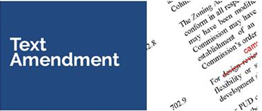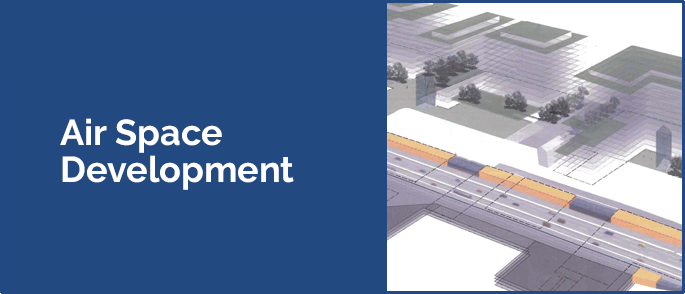
Initiating/Managing a ZC Case
Home > Initiating/Managing a ZC case
Cases heard before the Zoning Commission (ZC) generally pertain to property owners who wish to amend the Zoning Regulations, alter the Zoning Map, and/or develop their land beyond the limitations of the designated Zone District, usually on multiple lots. In addition, the ZC hears cases relating to new or further processing of campus plans and design review.
ZC cases fall under two categories: contested and rulemaking cases. Contested cases are adjudicatory in nature, and present issues for resolution at a public hearing that will potentially affect a relatively small number of persons or properties. Contested cases involve primarily questions of fact applicable to a small number of persons or properties, while broader issues of public policy are secondary concerns. Rulemaking cases, on the other hand, are legislative in nature and present issues for resolution at a public hearing that will potentially affect large numbers of persons or property or the public in general. Examples of rulemaking cases include:
- A zoning text or map amendment that is proposed in furtherance of the Comprehensive Plan or other public law or policy;
- Cases in which the primary issues involve land use and urban planning and zoning policies, such as the development pattern of the city or a particular geographic area, population density, distribution of employment centers, traffic and transportation patterns, and related matters; and
- Cases in which the facts, information, and opinions sought for the public hearing are to come from a wide cross-section of the public.
The following are the different types of Zoning Commission cases:
 A map amendment is a request for a zone change from one zone to another in a specific area of the District. Map amendments are considered either contested or rulemaking depending on the property or properties ownership and lay out (contiguous or non-contiguous). The ZC will determine whether a map amendment case is a contested or rulemaking case at the time of setdown. Click here to view the Map Amendment instructions.
A map amendment is a request for a zone change from one zone to another in a specific area of the District. Map amendments are considered either contested or rulemaking depending on the property or properties ownership and lay out (contiguous or non-contiguous). The ZC will determine whether a map amendment case is a contested or rulemaking case at the time of setdown. Click here to view the Map Amendment instructions.
 A proposal to amend the text of the Zoning Regulations may be initiated by an individual, a business or corporation, a community organization, or a public agency by petitioning the ZC. Click here to view the Text Amendment form and instructions page.
A proposal to amend the text of the Zoning Regulations may be initiated by an individual, a business or corporation, a community organization, or a public agency by petitioning the ZC. Click here to view the Text Amendment form and instructions page.
 The ZC reserves the right to permit certain uses of land by special exception in the following Special Purpose Zones: Southeast Federal Center (SEFC), Capital Gateway (CG), Hill East District (HE), and Union Station North District (USN). Click here to view the Design Review form and instructions page.
The ZC reserves the right to permit certain uses of land by special exception in the following Special Purpose Zones: Southeast Federal Center (SEFC), Capital Gateway (CG), Hill East District (HE), and Union Station North District (USN). Click here to view the Design Review form and instructions page.
 A PUD is a mechanism that allows developers flexibility to meet objectives such as use, density, site planning, and design. To achieve this flexibility, developers may incorporate public benefits that exceed those that could have been achieved under the general provisions of the Zoning Regulations. PUDs may be sought in conjunction with a map amendment or a related map amendment (related map amendments are specific to the PUD for the life of the development). Click here to view the PUD forms and instructions page.
A PUD is a mechanism that allows developers flexibility to meet objectives such as use, density, site planning, and design. To achieve this flexibility, developers may incorporate public benefits that exceed those that could have been achieved under the general provisions of the Zoning Regulations. PUDs may be sought in conjunction with a map amendment or a related map amendment (related map amendments are specific to the PUD for the life of the development). Click here to view the PUD forms and instructions page.
 Large institutions, such as colleges and universities, are required to prepare and submit a plan to the ZC for approval. After a “campus plan” is approved, future development of the “campus” must be in accordance with the plan. A campus plan is treated in the same manner as a special exception. Click here to view the Campus Plan form and instructions page.
Large institutions, such as colleges and universities, are required to prepare and submit a plan to the ZC for approval. After a “campus plan” is approved, future development of the “campus” must be in accordance with the plan. A campus plan is treated in the same manner as a special exception. Click here to view the Campus Plan form and instructions page.
 Applicants wishing to develop rented or granted space above or below streets and alleys in the District of Columbia, under specified conditions, are referred to the ZC by the Building and Land Regulation Administration (BLRA) within the Department of Consumer and Regulatory Affairs (DCRA). Click here to view the Air Space Development form and instructions page.
Applicants wishing to develop rented or granted space above or below streets and alleys in the District of Columbia, under specified conditions, are referred to the ZC by the Building and Land Regulation Administration (BLRA) within the Department of Consumer and Regulatory Affairs (DCRA). Click here to view the Air Space Development form and instructions page.


